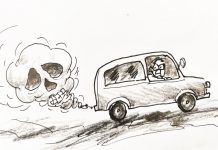The wildfires, which are razing Los Angeles and leaving ash and heartbreak in their wake, have whipped up a firestorm of not just the winds of destruction but also a heated debate. Some claim this inferno is divine judgment—a celestial payback for what they see as the city’s moral decay. While I’m not dogmatic in declaring these fires to be God’s judgment, I won’t dismiss the notion that actions—collective or individual—often come with consequences. What I do know is what the Bible says: God should not be blasphemed (Galatians 6:7). History is replete with examples of people reaping the consequence of their mockery, and that’s worth reflecting on.
Let’s talk first about this whole “God’s judgment” theory. It’s a bold thing to say, isn’t it? Almost like saying God is up there, monitoring Hollywood’s every move, with a thunderbolt in one hand and a matchstick in the other. But if we’re being honest, it’s a bit simplistic. California wildfires are not new phenomena; they’re as much a part of the state as its beaches and celebrity sightings. The science behind them is solid—dry seasons, climate change, and human negligence. It’s not probably divine lightning striking these hills aflame; it’s usually just sparks from bad wiring or some careless camper’s smoldering firepit.
But there’s more to it than that. If you think about it, claiming these disasters as divine judgment can feel like scapegoating. It diverts attention away from our human failures: poor land management, urban sprawl, climate indifference—to a convenient narrative of “it’s God’s will.” That mindset is a smokescreen, pun intended. It takes us off the hook for being poor stewards of the earth, a role we were called into in Genesis. If the world is groaning, it’s not always due to someone else’s moral decisions; more often than not, it’s a result of our communal neglect of the environment.
Yet there’s some truth to the thought that to mock God—or rather, to live in rebellion against His principles—comes with a price. The world celebrates ways of life that are based on excess, games of power, and self-focus. The unbridled pursuit of fame, money, and influence is not what leads to flourishing communities; most often, it breeds alienation and chaos. Perhaps the fires are not divine judgment, but they are most certainly a glaring reminder of how quickly things we idolize can go up in flames—literally and metaphorically.
And then there’s the irony of the very people who claim to be God’s mouthpieces during these disasters. They cry, “judgment! “ from pulpits or social media platforms but are suspiciously quiet when it comes to offering practical help. It’s easier to wag a finger at Hollywood than to roll up your sleeves and rebuild homes. Meanwhile, firefighters—modern-day Davids facing the Goliath of infernos—work tirelessly, risking life and limb. These are the unsung heroes.
If judgment belongs to anyone, it’s probably not armchair theologians with apocalyptic soundbites. Remember when you heard the same judgmental comments after the Yolanda devastation when some people claimed it was God’s judgment upon Taclobanons? How did you feel? Did you agree with all your heart? Even if we interpret these disasters as a wake-up call, it’s not our job to hold the gavel. It’s our job to be first responders—not to fires but to pain and loss.
We live in a broken world. Fires, floods, hurricanes—they happen, and often strike indiscriminately. Whether they are divine judgments or the natural consequence of living in a fallen creation is a mystery we may never fully untangle. Maybe the best response isn’t to argue whether the fires are divine retribution but to consider how we respond. Do we rebuild with humility? Do we confront the human factors that are exacerbating these tragedies? Do we offer grace to those suffering instead of judgment? If God is speaking through these disasters, it’s probably less about wrath and more about a call to reflection, stewardship, and love—the kind that rebuilds more than just burned-out homes.




